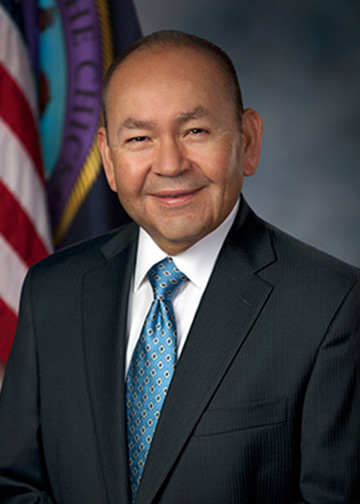
Governor Bill Anoatubby
Seeley Chapel gathering marked renewed Chickasaw dynamism
By Bill Anoatubby, Governor, Chickasaw Nation
It was October 26, 1963 when Chickasaws gathered at Seeley Chapel, near Connerville, Okla. to witness Overton James’ oath of office as the appointed Governor of the Chickasaw Nation. It was a unique time, and it marked the genesis of a new and critically important period in Chickasaw history.
A feeling of great optimism permeated the meeting at Seeley Chapel. The appointment by President Kennedy was important because James looked at things differently. He would advocate for Chickasaw self-governance and the ability of the people to make our own decisions regarding our tribe and our government. Gov. James would become our first modern Governor elected by the people in 1971, the first Chickasaw election since 1904.
Chickasaws gathered that day under arbors. This gathering was really the precursor of our current Annual Meeting. Chickasaws met, and meet, to share news and to hear the reports from the Governor and tribal officials on the state of the Chickasaw Nation.
At the time the Seeley Chapel gathering took place, the Chickasaw people had endured almost 60 years of having virtually no power over their tribal government and the decisions made on their behalf. Our Governor was a federally-appointed post with little real ability to influence policy and decision-making.
All the tribes across the country had endured decades of poverty and disenfranchisement caused by failed federal policy. Native people were not allowed to make decisions for themselves, and the federal government on several occasions attempted to terminate tribes and their governments completely. This unfortunately eliminated some tribes from federal recognition, but most tribes, including the Chickasaw Nation, endured and persevered through bleak days.
Following Gov. James’ appointment to office in 1963, Chickasaw people were spurred to action. We lobbied for our sovereign rights and self-governance. During the 1960s, the heavy hand of federal Indian policy started to lighten.
In 1970, President Nixon delivered his Special Message on Indian Affairs to the U.S. Congress. Nixon recognized the tremendous failures of federal Indian policy. He condemned the federal government’s approach to Indian tribes and advocated for Indian self-determination. He eventually signed over 50 pieces of legislation supporting tribal self-rule.
The Chickasaw Nation, in 1971, conducted its first free elections in 67 years. Gov. James was elected by the people to serve as their Governor. We then started on a path that would lead us to true self-governance, strengthen our sovereign status, and deliver the vote back to the Chickasaw people.
When I was elected Governor in 1987, we had made progress. The federal government had relinquished its tight grip on the tribes, but federal funding was very sparse and it was left to us to figure out how to fund the programs our people needed. So, we determined we would do what our ancestors before us had done – we built a strategy to succeed, and we executed that strategy! We built our own system of support designed to serve our people well.
And we have met with success! Our commercial enterprises, built up over the years, now provide the vast majority of the resources for most of our important programs and services.
The gathering at Seeley Chapel was a watershed event that planted the seeds of progress for the Chickasaw Nation.
As they say in business, Chickasaws wore out a lot of shoe leather! Chickasaw people from that time worked hard, lobbied hard and dedicated all their efforts to a fully self-governing, robust tribe.
There is plenty of work ahead. We constantly endeavor to be forward-thinking and remember our mission to enhance the overall quality of life of the Chickasaw people.
The awakening at Seeley Chapel is our touchstone to keep moving forward. The Seeley Chapel movement set the groundwork for who we are today - a powerful and dynamic tribe dedicated to serving Chickasaw people everywhere.